|
|
|
Sort Order |
|
|
|
Items / Page
|
|
|
|
|
|
|
| Srl | Item |
| 1 |
ID:
118972
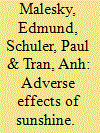

|
|
|
|
|
| Publication |
2012.
|
| Summary/Abstract |
An influential literature has demonstrated that legislative transparency can improve the performance of parliamentarians in democracies. In a democracy, the incentive for improved performance is created by voters' responses to newly available information. Building on this work, donor projects have begun to export transparency interventions to authoritarian regimes under the assumption that nongovernmental organizations and the media can substitute for the incentives created by voters. Such interventions, however, are at odds with an emerging literature that argues that authoritarian parliaments primarily serve the role of co-optation and limited power sharing, where complaints can be raised in a manner that does not threaten regime stability. We argue that under these conditions, transparency may have perverse effects, and we test this theory with a randomized experiment on delegate behavior in query sessions in Vietnam, a single-party authoritarian regime. We find no evidence of a direct effect of the transparency treatment on delegate performance; however, further analysis reveals that delegates subjected to high treatment intensity demonstrate robust evidence of curtailed participation and damaged reelection prospects. These results make us cautious about the export of transparency without electoral sanctioning.
|
|
|
|
|
|
|
|
|
|
|
|
|
|
|
|
| 2 |
ID:
118973
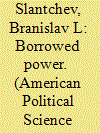

|
|
|
|
|
| Publication |
2012.
|
| Summary/Abstract |
Military expenditures are often funded by debt, and sovereign borrowers are more likely to renege on debt-service obligations if they lose a war than if they win one or if peace prevails. This makes expected debt service costlier in peace, which can affect both crisis bargaining and war termination. I analyze a complete-information model where players negotiate in the shadow of power, whose distribution depends on their mobilization levels, which can be funded partially by borrowing. I show that players can incur debts that are unsustainable in peace because the opponent is unwilling to grant the concessions necessary to service them without fighting. This explanation for war is not driven by commitment problems or informational asymmetries but by the debt-induced inefficiency of peace relative to war. War results from actions that eliminate the bargaining range rather than from inability to locate mutually acceptable deals in that range.
|
|
|
|
|
|
|
|
|
|
|
|
|
|
|
|
| 3 |
ID:
118975
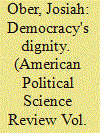

|
|
|
|
|
| Publication |
2012.
|
| Summary/Abstract |
Dignity, as equal high standing characterized by nonhumiliation and noninfantilization, is democracy's third core value. Along with liberty and equality, it is a necessary condition for collective self-governance. Dignity enables robust exercise of liberty and equality while resisting both neglectful libertarianism and paternalistic egalitarianism. The civic dignity required for democracy is specified through a taxonomy of incompletely and fully moralized forms of dignity. Distinctive features of different regimes of dignity are modeled by simple games and illustrated by historical case studies. Unlike traditional meritocracy and universal human dignity, a civic dignity regime is theoretically stable in a population of self-interested social agents. It is real-world stable because citizens are predictably well motivated to defend those threatened with indignity and because they have resources for effective collective action against threats to dignity. Meritocracy and civic dignity are not inherently liberal, but may persist within a liberal democracy committed to universal human dignity.
|
|
|
|
|
|
|
|
|
|
|
|
|
|
|
|
| 4 |
ID:
118978


|
|
|
|
|
| Publication |
2012.
|
| Summary/Abstract |
Can combat experience foster organizational skills that engender political collective action? We use the arbitrary assignment of troops to combat in World War II to identify the effect of combat experience on two channels that change local ethnic composition and future political control: ethnic cleansing and co-ethnic immigration. During the Partition of South Asia, we find that ethnically mixed districts whose veterans were exposed to greater combat exhibited greater co-ethnic immigration and minority ethnic cleansing, with minority out-migration achieved with lower loss-of-life. Further, where ethnic groups had been in complementary economic roles or the minority received greater combat experience, there was less ethnic cleansing. We interpret these results as reflecting the strategic role of ethnic cleansing and co-ethnic immigration by groups seeking political control and the role of combat experience in enhancing organizational skills at credibly threatening violence and engaging in collective action.
|
|
|
|
|
|
|
|
|
|
|
|
|
|
|
|
| 5 |
ID:
118969


|
|
|
|
|
| Publication |
2013.
|
| Summary/Abstract |
Particularistic spending, a large literature argues, builds support for incumbents. This literature equates money spent in the district with the credit constituents allocate. Yet, constituents lack the necessary information and motivation to allocate credit in this way. We use extensive observational and experimental evidence to show how legislators' credit claiming messages-and not just money spent in the district-affect how constituents allocate credit. Legislators use credit claiming messages to influence the expenditures they receive credit for and to affect how closely they are associated with spending in the district. Constituents are responsive to credit claiming messages-they build more support than other nonpartisan messages. But contrary to expectations from other studies, constituents are more responsive to the total number of messages sent rather than the amount claimed. Our results have broad implications for political representation, the personal vote, and the study of U.S. Congressional elections.
|
|
|
|
|
|
|
|
|
|
|
|
|
|
|
|
| 6 |
ID:
118977
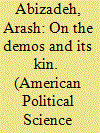

|
|
|
|
|
| Publication |
2012.
|
| Summary/Abstract |
Cultural-nationalist and democratic theory both seek to legitimize political power via collective self-rule: Their principle of legitimacy refers right back to the very persons over whom political power is exercised. But such self-referential theories are incapable of jointly solving the distinct problems of legitimacy and boundaries, which they necessarily combine, once it is assumed that the self-ruling collectivity must be a prepolitical, in principle bounded, ground of legitimacy. Cultural nationalism claims that political power is legitimate insofar as it expresses the nation's prepolitical culture, but it cannot fix cultural-national boundaries prepolitically. Hence the collapse into ethnic nationalism. Traditional democratic theory claims that political power is ultimately legitimized prepolitically, but cannot itself legitimize the boundaries of the people. Hence the collapse into cultural nationalism. Only once we recognize that the demos is in principle unbounded, and abandon the quest for a prepolitical ground of legitimacy, can democratic theory fully avoid this collapse of demos into nation into ethnos. But such a theory departs radically from traditional theory.
|
|
|
|
|
|
|
|
|
|
|
|
|
|
|
|
| 7 |
ID:
118970
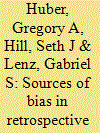

|
|
|
|
|
| Publication |
2012.
|
| Summary/Abstract |
Are citizens competent to assess the performance of incumbent politicians? Observational studies cast doubt on voter competence by documenting several biases in retrospective assessments of performance. However, these studies are open to alternative interpretations because of the complexity of the real world. In this article, we show that these biases in retrospective evaluations occur even in the simplified setting of experimental games. In three experiments, our participants (1) overweighted recent relative to overall incumbent performance when made aware of an election closer rather than more distant from that event, (2) allowed an unrelated lottery that affected their welfare to influence their choices, and (3) were influenced by rhetoric to give more weight to recent rather than overall incumbent performance. These biases were apparent even though we informed and incentivized respondents to weight all performance equally. Our findings point to key limitations in voters' ability to use a retrospective decision rule.
|
|
|
|
|
|
|
|
|
|
|
|
|
|
|
|
| 8 |
ID:
118976
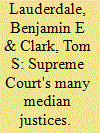

|
|
|
|
|
| Publication |
2012.
|
| Summary/Abstract |
One-dimensional spatial models have come to inform much theorizing and research on the U.S. Supreme Court. However, we argue that judicial preferences vary considerably across areas of the law, and that limitations in our ability to measure those preferences have constrained the set of questions scholars pursue. We introduce a new approach, which makes use of information about substantive similarity among cases, to estimate judicial preferences that vary across substantive legal issues and over time. We show that a model allowing preferences to vary over substantive issues as well as over time is a significantly better predictor of judicial behavior than one that only allows preferences to vary over time. We find that judicial preferences are not reducible to simple left-right ideology and, as a consequence, there is substantial variation in the identity of the median justice across areas of the law during all periods of the modern court. These results suggest a need to reconsider empirical and theoretical research that hinges on the existence of a single pivotal median justice.
|
|
|
|
|
|
|
|
|
|
|
|
|
|
|
|
| 9 |
ID:
118971


|
|
|
|
|
| Publication |
2012.
|
| Summary/Abstract |
This article uses a regression discontinuity design in close electoral races to disclose purely political reasons in the allocation of intergovernmental transfers in a federal state. We identify the effect of political alignment on federal transfers to municipal governments in Brazil, and find that-in preelection years-municipalities in which the mayor is affiliated with the coalition (and especially with the political party) of the Brazilian president receive approximately one-third larger discretionary transfers for infrastructures. This effect is primarily driven by the fact that the federal government penalizes municipalities run by mayors from the opposition coalition who won by a narrow margin, thereby tying their hands for the next election.
|
|
|
|
|
|
|
|
|
|
|
|
|
|
|
|
| 10 |
ID:
118968


|
|
|
|
|
| Publication |
2012.
|
| Summary/Abstract |
This article calls into question the conventional wisdom that incumbent parties are rewarded when unemployment is low and punished when it is high. Using county-level data on unemployment and election returns for 175 midterm gubernatorial elections and 4 presidential elections from 1994 to 2010, the analysis finds that unemployment and the Democratic vote for president and governor move together. Other things being equal, higher unemployment increases the vote shares of Democratic candidates. The effect is greatest when Republicans are the incumbent party, but Democrats benefit from unemployment even when they are in control. The explanation for these findings is that unemployment is a partisan issue for voters, not a valence issue, and that the Democratic Party "owns" unemployment. When unemployment is high or rising, Democratic candidates can successfully convince voters that they are the party best able to solve the problem.
|
|
|
|
|
|
|
|
|
|
|
|
|
|
|
|
| 11 |
ID:
118974


|
|
|
|
|
| Publication |
2012.
|
| Summary/Abstract |
Democratic theory is often portrayed as torn between two moments: that of disruption of rule, and the ordinary, ongoing institutionalization of politics. This dualism also marks contemporary democratic theory. In Jacques Rancière's theory of politics it takes the form of an emphasis on the ruptural qualities of the staging of novel democratic demands and the reconfiguration of the space of political argument. The reconfiguration of existing political imaginaries depends upon a moment of inscription, which remains underdeveloped in Rancière's work. Arguing that the possibility of inscription is indeed thematized in Rancière's more historical writings, but is often ignored by commentators, this article seeks to draw out the implications of a focus on inscription for democratic theory and practice. To flesh out this account, the article draws on Cavell's writings on exemplarity and the role of exemplars in fostering both critical reflection and the imagination of alternatives. The focus on such exemplars and an aversive, nonconformist ethos together facilitate a better understanding of what is required for such novel demands to be acknowledged and inscribed into democratic life.
|
|
|
|
|
|
|
|
|
|
|
|
|
|
|
|
|
|
|
|
|